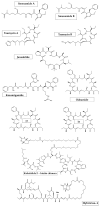Marine Peptides: Potential Basic Structures for the Development of Hybrid Compounds as Multitarget Therapeutics for the Treatment of Multifactorial Diseases
- PMID: 39684313
- PMCID: PMC11641501
- DOI: 10.3390/ijms252312601
Marine Peptides: Potential Basic Structures for the Development of Hybrid Compounds as Multitarget Therapeutics for the Treatment of Multifactorial Diseases
Abstract
Marine-derived peptides display potent antihypertensive, antioxidant, analgesic and antimicrobial biological effects. Some of them have also been found to have anticancer activity via various mechanisms differing from those of continental organisms. This diversity of properties-together with the peptides' efficacy, which has been confirmed in several in vitro and in vivo studies-make these compounds attractive as functional ingredients in pharmacy, especially in regard to multitarget drugs known as hybrids. Given the possibilities offered by chimeric structures, it is expected that a hybridization strategy based on a marine-derived compound could result in a long-awaited success in the development of new effective compounds to combat a range of complex diseases. However, despite the fact that the biological activity of such new hybrids may exceed that of their parent compounds, there is still an urgent need to carefully determine their potential off-targets and thus possible clinically important side effects. Given the above, the aim of this paper is to provide information on compounds of marine origin with peptide structures and to verify the occurrence and usage of hybrid compounds built from these structures. Furthermore, the authors believe that information presented here will serve to increase public awareness of the new opportunities arising from the combination of hybridization strategies with marine molecules with known structures and biological properties, thereby accelerating the development of effective drug candidates.
Keywords: efficacy; hybrid; marine peptides; safety profile; tolerability.
Conflict of interest statement
The authors declare no conflicts of interest.
Figures



Similar articles
-
Marine bioactive peptides as potential antioxidants.Curr Protein Pept Sci. 2013 May;14(3):189-98. doi: 10.2174/13892037113149990041. Curr Protein Pept Sci. 2013. PMID: 23721315 Review.
-
Recent Progress of Marine Polypeptides as Anticancer Agents.Recent Pat Anticancer Drug Discov. 2018;13(4):445-454. doi: 10.2174/1574892813666180430110033. Recent Pat Anticancer Drug Discov. 2018. PMID: 29708076 Review.
-
Antitumour bioactive peptides isolated from marine organisms.Clin Exp Pharmacol Physiol. 2017 Nov;44(11):1077-1082. doi: 10.1111/1440-1681.12808. Clin Exp Pharmacol Physiol. 2017. PMID: 28675498 Review.
-
Marine-Derived Bioactive Peptides for Biomedical Sectors: A Review.Protein Pept Lett. 2017;24(2):109-117. doi: 10.2174/0929866523666160802155347. Protein Pept Lett. 2017. PMID: 27491381 Review.
-
Investigation of the Anti-Prostate Cancer Properties of Marine-Derived Compounds.Mar Drugs. 2018 May 12;16(5):160. doi: 10.3390/md16050160. Mar Drugs. 2018. PMID: 29757237 Free PMC article. Review.
Cited by
-
In vitro inhibition of Streptococcus mutans by probiotic yogurt fortified with Lactobacillus paracasei and Sargassum angustifolium protein hydrolysate: a functional yogurt for teeth decay prevention.Iran J Microbiol. 2025 Jun;17(3):420-433. doi: 10.18502/ijm.v17i3.18825. Iran J Microbiol. 2025. PMID: 40612736 Free PMC article.
-
Multifaceted Marine Peptides and Their Therapeutic Potential.Mar Drugs. 2025 Jul 15;23(7):288. doi: 10.3390/md23070288. Mar Drugs. 2025. PMID: 40710513 Free PMC article. Review.
References
-
- Muchowska A., Redkiewicz P., Różycki K., Matalińska J., Lipiński P.F.J., Czuwara J., Kosson P. The analgesic hybrid of dermorphin/substance P and analog of enkephalin improve wound healing in streptozotocin-induced diabetic rats. Wound Repair Regen. 2020;28:177–184. doi: 10.1111/wrr.12775. - DOI - PubMed
Publication types
MeSH terms
Substances
LinkOut - more resources
Full Text Sources

